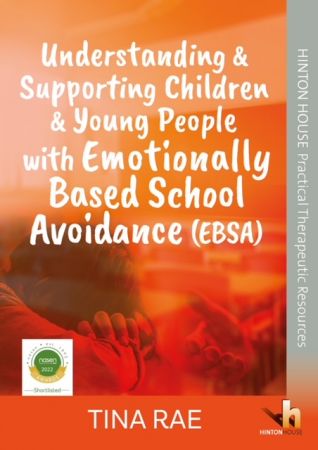- Behaviour Primary
- >
- Understanding & Supporting Children & Young People with Emotionally based School Avoidance (EBSA)
Understanding & Supporting Children & Young People with Emotionally based School Avoidance (EBSA)
A practical user-friendly toolkit of resources providing an overview of EBSA and strategies to support return to school, with a focus on transition from primary to secondary school and the effects of the COVID-19 pandemic.
By Tina Rae
Shortlisted for the nasen Awards 2022 Award for Publication
Children and young people miss school for a variety of reasons – as a response to personal, family, school or wider environmental issues. Emotionally Based School Avoidance or Refusal (EBSA) is a pattern of absence where reluctance, or refusal, to attend or stay in educational settings is rooted in anxiety or fear.
Risk factors vary, and it is important to understand the reasons for poor or non-attendance. This resource provides an overview of EBSA, useful assessments and key tools to help identify and support those young people who find school attendance a struggle owing to anxiety or fear.
Many children and young people – especially those with existing mental health issues – have found the experience of lockdown as a result of the COVID-19 pandemic particularly stressful and increased levels of anxiety are widespread. As a result, the need to provide support for increased levels of anxiety will be ongoing.
This toolkit of resources will give confidence to anyone working with or looking after young people in understanding the basis for EBSA and will provide practical, helpful strategies that can be implemented by parents and school-based staff to support young people back into the learning environment.
Contents Include:
- Definitions of EBSA.
- How EBSA differs from truancy.
- Recognising warning signs and triggers.
- Different types of anxiety and stress & links with school avoidance.
- Transition from primary to secondary school.
- Practical techniques and activities for supporting children & young people.
- Developing individualised support plans.
- Working with parents.
- The role of the key adult & nurturing relationships.
- Top tips for home and school to support transition back to the classroom.
Resources include: Checklists, Assessments, Handouts & Activity Resources for use by SENCOs, Mental Health Leads, Learning Mentors, Teachers, Counsellors, Social Care Professionals and Parents/Carers Parents & Cares.
https://www.thesendcast.com/emotionally-based-school-refusal – podcast discussing how to support children with emotionally based school phobia/avoidance.
128pp A4 paperback

